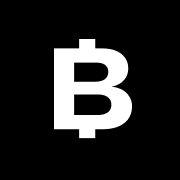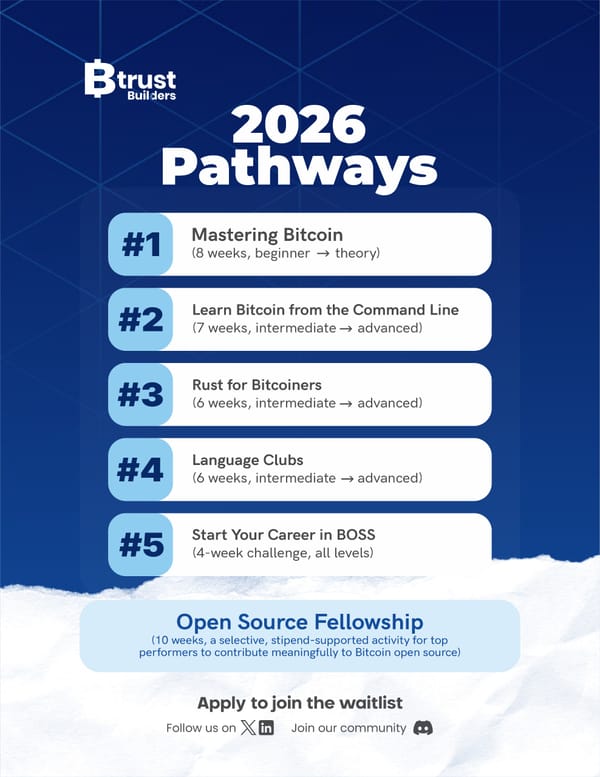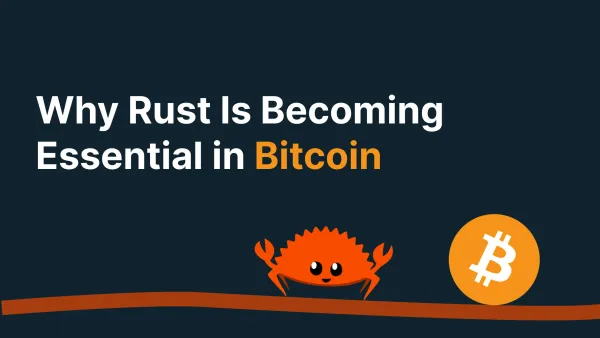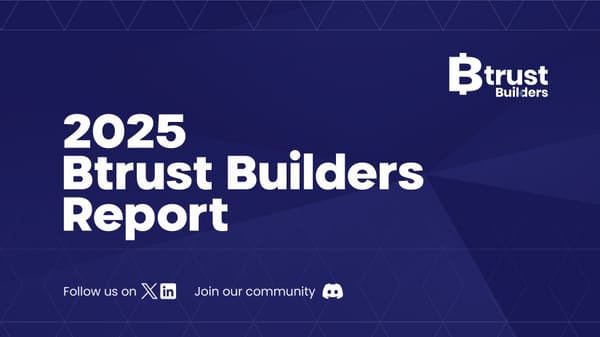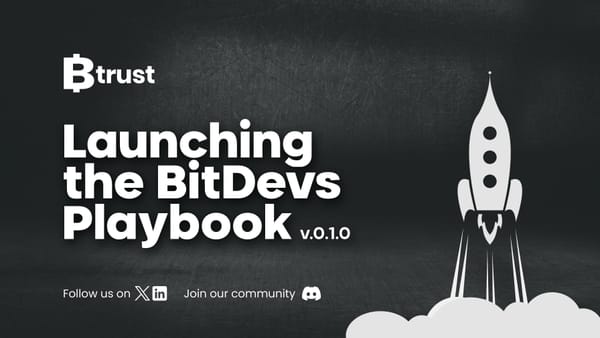From Startups to Satoshis: My Bitcoin Journey
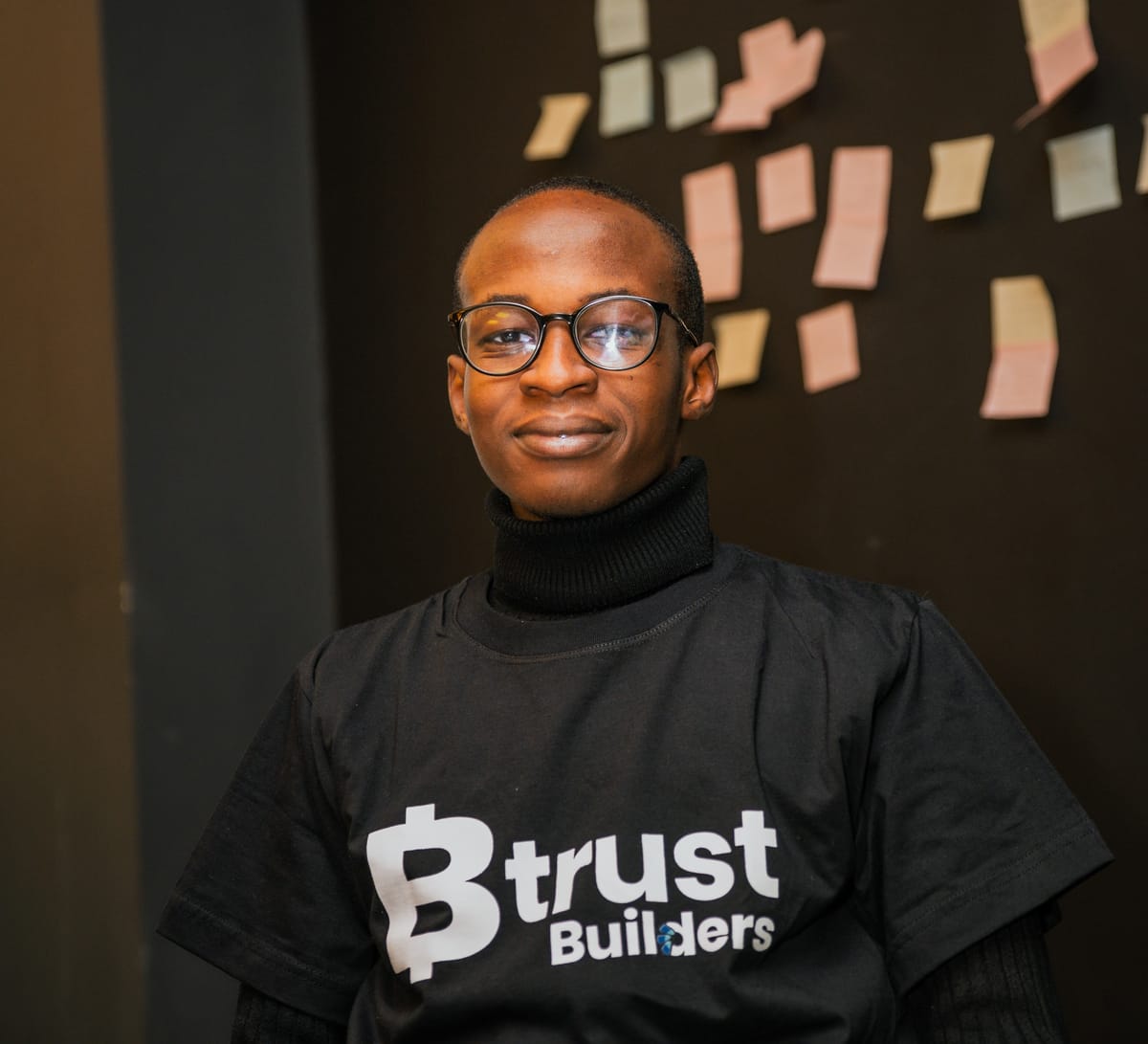
Written by Abdullahi Yunus
In this article, I’ll share my journey—from discovering Bitcoin to becoming a Btrust Builder and eventually a Btrust grantee. I’ll walk you through how it all started, how it’s going, and what I hope to achieve in the future.
Professional Background
Before discovering Bitcoin, I was a full-stack software engineer and an electrical engineering student at Ahmadu Bello University. I have experience working with JavaScript, TypeScript, and Python. I worked mostly on short-term, part-time contracts with startups. These jobs were very demanding, and many projects I worked on did not succeed in the real world.
What frustrated me most about working on some of these projects was sacrificing so much time and effort on things that were eventually abandoned. Even though it was often beyond my control or the management’s, it still felt disappointing and like a wasted effort. But regardless, these experiences pushed me into learning so many things and shaped my overall experience in software development.
Seeking a New Direction
After working on various startup projects, I realized I wasn't growing as much as I wanted and was not focusing on the projects I was truly passionate about. I kept working on similar ideas with only slight differences. I knew it was time for a change.
I wanted to find something meaningful in software to focus on. I looked into machine learning, data engineering, and cloud computing. Eventually, I chose blockchain development, starting with Ethereum, because it and its adjacent technologies, such as web3 and NFT, were popular at the time.
However, I didn’t find the journey exciting because I didn’t take the time to learn why Ethereum or the adjacent technologies were created. I was solely interested in learning something new and hoping to find something meaningful to contribute to for the long term.
Discovering Bitcoin
In early 2023, I saw on a friend's WhatsApp status a call to join the Qala Mastering Bitcoin course. I asked him for more details, and he explained what the course covered. I found his explanation interesting. I had heard of Bitcoin before, but I only thought of it as a coin for trading.
I joined the course and graduated after 6 weeks. By that time, I had a good understanding of the theoretical aspects of Bitcoin, its purpose, and how people use it beyond just trading but still was not convinced it was something I wanted to pursue long-term.
I decided to move on to the next phase, a 5-week Introduction to Bitcoin Protocol Development Course by Qala. I gained clarity on various technical aspects of Bitcoin and was able to reinforce my understanding of the technology thanks to this course. At this point, I was convinced because the course covered a wide range of fascinating technical topics that I found very exciting, including decentralization, networking, security, cryptography, and game theory, all of which are used in Bitcoin.
The Btrust Builders Fellowship
After completing 5 weeks of the Introduction to Bitcoin Protocol Development Course and meeting the graduation requirements, I had an interview with the Qala team. They wanted to assess my knowledge and programming experience before I could move on to the next important stage: the 3-month Qala Bitcoin Fellowship Cohort. Towards the end of that year, Qala was acquired by Btrust, and hence the fellowship was renamed to Btrust Builders Fellowship.
The fellowship started in January 2024 and required at least 20 hours of commitment each week. Unlike the preliminary courses I took with Qala before, this fellowship needed more focus and was more in-depth. We were advised that the only job we should have besides the fellowship is our daily job. I chose to leave my job at a startup because I was still studying at school. I realized I couldn't manage school workloads, the fellowship, and startup work all at once. I decided to concentrate on school and the fellowship.
The fellowship was very demanding. Although we were advised to dedicate 20 hours each week to the fellowship, I ended up spending much more time than that every week to complete the required tasks. We took part in many activities, such as daily reports and stand-up meetings, weekly reading lists, writing at least one article every two weeks, working on group projects and research, meeting with open-source project maintainers, and contributing to open-source projects of our choosing, among other things.
Open-Source Contributions
During the program, I wrote several articles explaining topics I found interesting, including:
- How Bitcoin Solves the Byzantine Generals' Problem
- Understanding Output Descriptors
- Chain Reorganization in Bitcoin
- Why We Pay Transaction Fees
- Guide to Multisig
I also worked on a group project called SatsEye, which is a block explorer, as my group's research focused on compact block filters (BIP158).
I began contributing to two open-source projects: Lightning Polar and Lightning Network Daemon (LND). I chose to contribute to Polar because, during my first week in the fellowship, I had to set up Bitcoin Core and LND locally. This process was difficult, and many of the fellows faced various challenges. I realized that these setup issues and challenges can discourage new developers from joining and contributing to the Bitcoin ecosystem. Polar lets developers spend less time setting up their development environment and more time building, so I felt it was only logical to work on this important tool.
Additionally, I chose to contribute to LND because at the beginning of the fellowship I wanted to learn either Golang or Rust, and I ended up going with Golang. I looked into projects using Golang in the Bitcoin ecosystem, and LND caught my attention because one aspect of Bitcoin that caught my attention was the Lightning Network.
By the time the fellowship ended, I had a great deal of experience contributing to open-source Bitcoin projects. I had reviewed and created several pull requests, including some significant ones in both projects. Some of these were merged, while others are still under review.
Transition to a Bitcoin Open-Source Developer
I started the Btrust Builders fellowship alongside over 50 developers and was excited to be one of the 17 who graduated. At graduation, we had a Proof of Work Showcase where each of us presented our projects and open-source contributions from the fellowship and what we hope for in the future. I shared the articles I’d written and projects I had worked on, explaining my focus on contributing to LND and Polar in the future. Shortly after, I was selected as a potential candidate for the Btrust Starter Grant. I submitted a proposal outlining my planned work during the grant period.
While I waited for my proposal to be reviewed, I continued to contribute to Bitcoin open-source projects. However, I couldn't focus fully on this because I needed to take on other jobs to make ends meet, but I made sure I dedicated some time, especially during the weekends, to move my open-source contributions forward.
Fast-forward to December 2024: Btrust invited me and fully sponsored my trip to attend the Btrust Developers Day and Africa Bitcoin Conference, which was held in Nairobi, Kenya.
During my time in Nairobi, I had many joyful experiences. I took part in various activities and discussions, including the Btrust Gathering, Btrust Developers Day, and several dinners. I also attended sessions at the Africa Bitcoin Conference and helped organize the Immersive Bitcoin Education: Integrating LARP for Engaging Learning Experience. Most importantly, I met in person with many people I had been in contact with for a long time.
Towards the end of the conference, I learned that I was being re-considered for the Btrust Starter Grant. This was an amazing moment for me because it meant I could finally work on projects I truly care about full-time and get compensated for it.
On the last day of the conference, the Btrust team announced their Q4 2024 grantees on the main stage of the Africa Bitcoin Conference for the world to see, and at that moment I realized all the effort I put in and the risks I took were worth it—I was now a Btrust Grantee.

My Future Outlook
I’m thankful for how my journey unfolded, from working on short-term startup projects to becoming a full-time Bitcoin open-source contributor. Working on Bitcoin has given me a strong sense of purpose. The community, technology, and work have helped me grow in ways I never expected.
I have been working full-time on Bitcoin open-source projects for some months now, with support and encouragement from my mentors, which helps me grow. I also continue to get inspired by the work others do in the space and the growing number of new developers eager to contribute to Bitcoin open-source projects.
I hope sharing my story will motivate more developers to consider and explore Bitcoin and get involved in Bitcoin open-source projects.
If you’re thinking about changing your career, I encourage you to find something you truly love. It may take time, but when you find it, the personal and professional rewards will be worth it.
